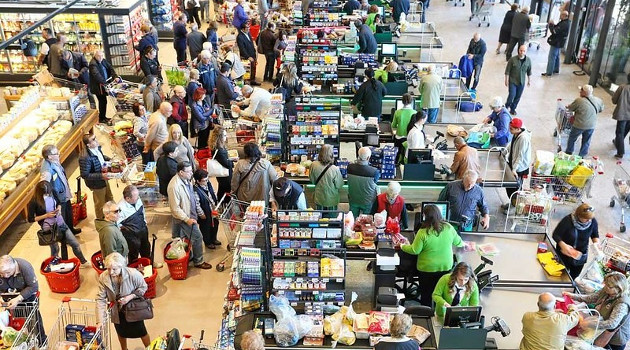Exactly one month ago, I wrote “A Primer on Price Gouging” to explain why government-mandated price controls are an unwise response when prices for certain goods climb after a disaster.
Here’s a video from Johan Norberg on the topic.
And here’s Professor Michael Munger from Duke University on the same issue.
Those are both excellent presentations.
In a column for the Nashville Business Journal, Professor Daniel Smith explains in written form why laws against price gouging inevitably backfire.
High prices in the wake of a disaster or in the face of uncertainty often spark consumer outrage and calls for stricter price-gouging laws. Such measures, however, would actually harm consumers searching for necessities in emergencies. …in the face of uncertainty, such as the coronavirus, it is instinctive for consumers to stock up on goods, such as water, toilet paper, and nonperishable food.
Stores need some way to discourage consumers from hoarding or wasting necessities as well as to encourage the increased manufacture and delivery of necessities to the affected area. Higher prices, driven by the increase in demand for these goods, naturally incentivize both of these important functions. …higher price encourages consumers outside of the affected area to also economize on their purchases. The increased demand for building materials for rebuilding New Orleans after Hurricane Katrina drove building material prices up across the nation, leading unaffected consumers to delay less essential building or remodeling projects. …Higher prices also encourage the manufacture and delivery of necessities to the affected area. …higher market prices, by increasing the supply of necessary goods, is the driving force that will ultimately push the price back down. …there is always concern for providing for low-income residents. But the empty shelves created by price gouging laws do little to help them.
It’s worth pointing out, incidentally, that workers can engage in “price gouging” as well.
This tweet from Mark Perry cites a story about nurses being able to earn much more money if they agree to work in New York City.
Travel Nurses Are Earning More Than $10K Per Week and $100K for 13-Week Assignments To Work In NYC. Wait… Isn’t that Unfair and Illegal #PriceGouging? @Jeff_Jacoby @danieljmitchell @swinshi @scottlincicome @JohnStossel @stevenfhayward @WSJopinion https://t.co/WB2RQ2Ocl3
— Mark J. Perry (@Mark_J_Perry) April 2, 2020
For what it’s worth, I fully support those nurses extracting much higher pay. They’re going into the medical equivalent of a war zone.
And that’s a good outcome for society. Allowing prices (whether for goods or labor) to rise and fall in response to market conditions ensures that resources go where they have the most value.
Sadly, many politicians in Washington either don’t know or don’t care about the harmful impact of intervention.
Indeed, the House of Representatives wants to demonize so-called price gougers, as reported by Billy Billion of Reason.
When it comes to the federal government’s coronavirus response, there is much room for self-criticism. But that won’t come from the House’s new select oversight committee, announced by Speaker Nancy Pelosi (D–Calif.)…
House Majority Whip Jim Clyburn (D–S.C.), telling CNN’s Jake Tapper that the committee will instead focus on things like “price gouging” and “profiteering.” …In other words, if Clyburn’s description is to be taken at face value, lawmakers will scapegoat private businesses, as opposed to delving into the list of ways the government has failed the American public. …The South Carolina representative said the House will…punish those that set high prices on essential goods, though he didn’t say how this would work in practice.
What’s really galling about the actions of Pelosi, Clyburn, and other politicians is that they’re insulated from the policies they impose on the rest of us.
 They have voted themselves generous pensions, so they they don’t have to worry about a bankrupt Social Security system.
They have voted themselves generous pensions, so they they don’t have to worry about a bankrupt Social Security system.
They have voted themselves lavish fringe benefits, so they don’t have to worry about dealing with the Obamacare disaster.
And they doubtlessly have arranged to be first in line for goods and services if there are shortages caused by anti-gouging laws.
Maybe, just maybe, they’re part of the problem rather than part of the solution.
———
Image credit: Paul Townsend | CC BY-SA 2.0.

